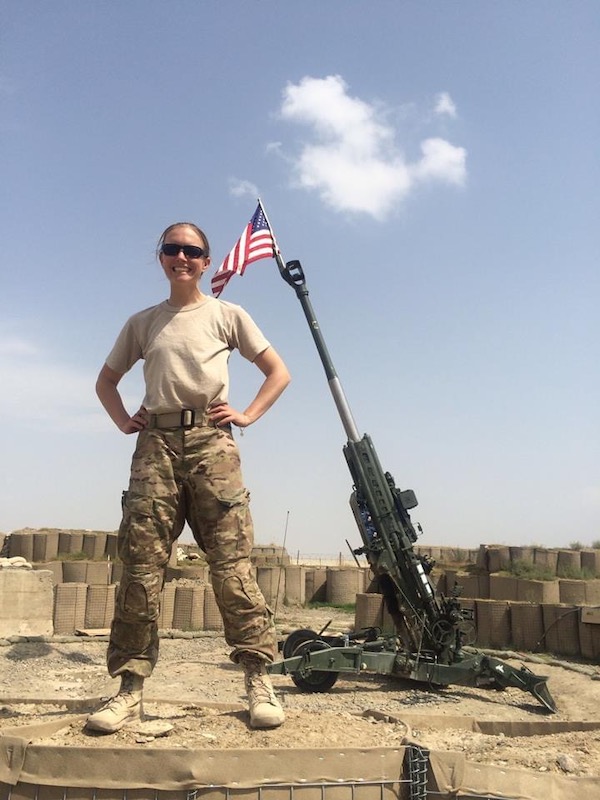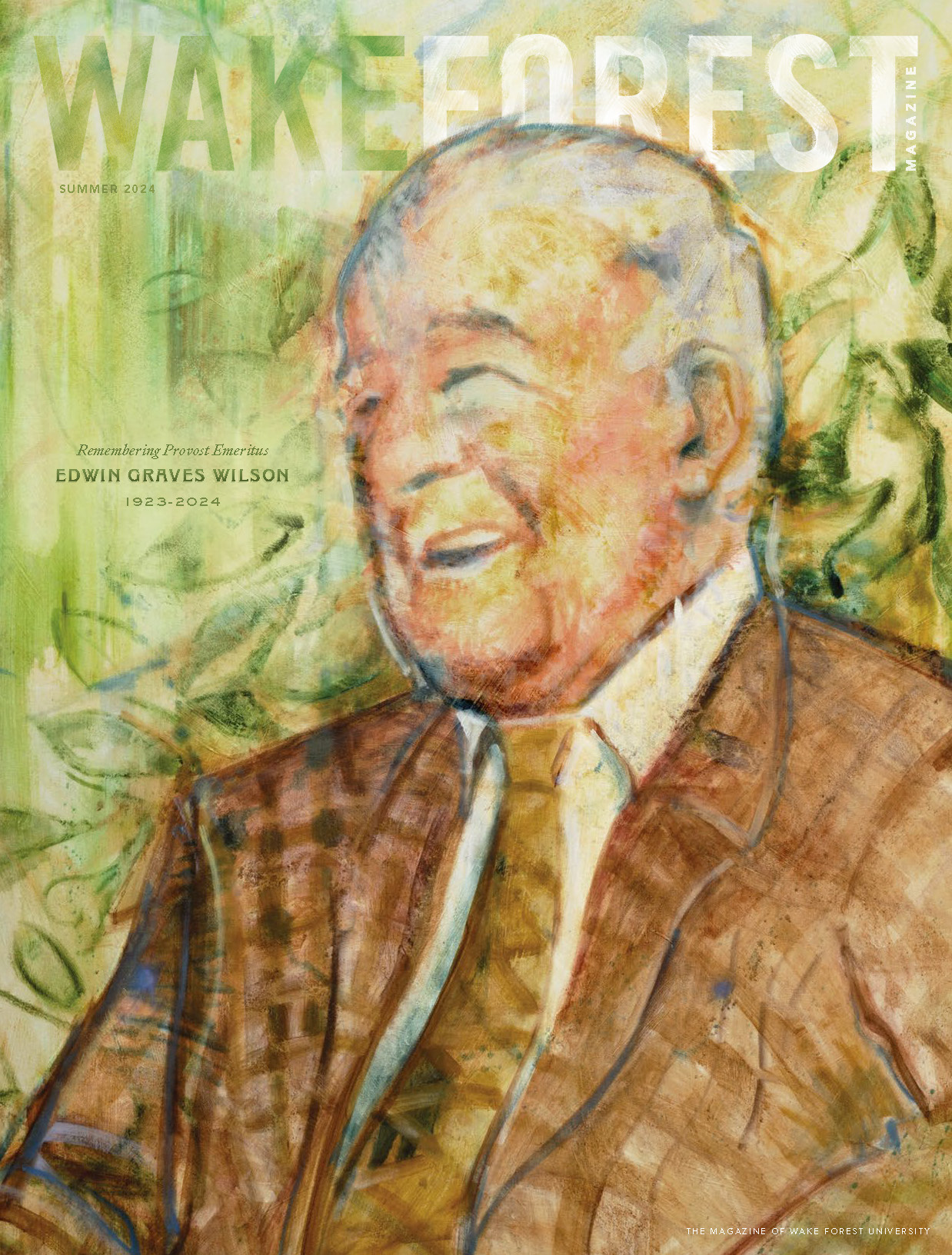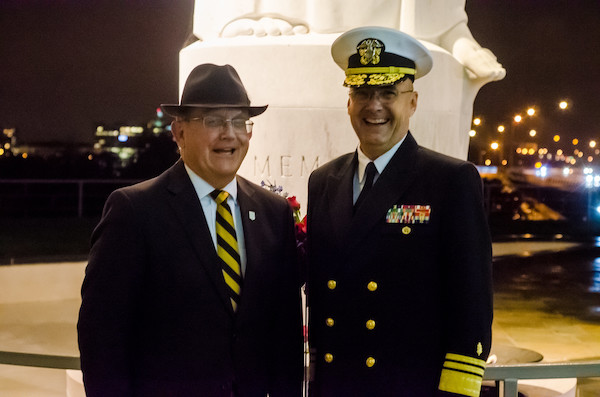
Top, a Wake Forest ROTC Veterans Day ceremony. Photo courtesy of De'Noia Woods ('13); above, Joe Wescott (’81, MA ’00) and Forrest Faison (’80, D.Sc. ’18, P ’23), co-presidents of the Decorated Deacs community. Photos here and below provided by Connor Murphy
How do the values of military service converge with Wake Forest’s motto, Pro Humanitate?
For the University’s veteran community, the connection is driven by developing personal relationships, aiding those in need and helping others achieve their highest potential. These common threads are fostered on the Reynolda Campus, but they’re put into action as alumni enter into the world for the good of humanity.
As an Army logistics officer and ROTC “No Fear!” Battalion alumnus who has been fortunate enough to command great soldiers, follow experienced leaders and learn a great deal from each of them, I wanted to explore this question in observance of Veterans Day. I did so with the Decorated Deacs community — the members of our Wake Forest family who have made the commitment to serve in uniform.
Rear Admiral Forrest Faison (’80, D.Sc. ’18, P ’23), co-president of the Decorated Deacs, shared his insights on the connection between Wake Forest’s motto and the U.S. Armed Forces.
With years of distinguished service as a Navy physician, combat hospital commander and later as the U.S. Navy Surgeon General, Faison emphasized that Pro Humanitate entails leaving a better world for future generations through service.
“Life is about helping other people, and being in the service allowed me to do that,” said Faison.
During his tenure as surgeon general of the Navy, Faison oversaw care for 2.8 million people globally and the training of more than 6,000 physicians, nurses and medical technicians each year across nearly every time zone.
From humanitarian aid to combat life support and building enduring relationships, military service has afforded generations of Demon Deacons with the opportunity to serve others, as Pro Humanitate urges us to do.
“It’s a creed, culture and an ethos that they carry with them for life,” said Faison. “It’s a common theme I’m sure you’ll have found with other Decorated Deacs. That’s why you see many of them go on to other service activities.”
Faison connected me with an incredible group of Decorated Deacs to learn more — and I found he was right.
Lt. Col. Laura Cookman Tilley (’06) applied early decision to Wake Forest without setting foot on the Reynolda Campus. She relied on her intuition, cross-referencing lists of the nation’s top biology and pre-med programs and sensing that Winston-Salem was the right place for her.
Medicine was her avenue to serve, and the principles of Pro Humanitate resonated with her aspirations. She discovered the Army ROTC program on campus, and as the daughter of a service member, decided to apply.
“I think I scared my parents with that one,” joked Tilley. “But for me, service is a big part of who I am.”
Tilley persevered through pre-med requirements, life as a cadet and a wide range of commitments outside the classroom. By the time she reached George Washington School of Medicine & Health Sciences, Tilley felt thoroughly prepared for the work ahead of her.
“Other people were coming from Ivy League schools and didn’t have the time management I had from Wake Forest,” said Tilley.
With skills as chief resident in emergency medicine and two years as a trauma physician in Tacoma, Washington, Tilley deployed with the 3rd Cavalry Regiment as a battalion surgeon in Khost, Afghanistan, on the eastern border with Pakistan in 2015.
“I got pulled at the last minute to go to this location,” said Tilley. “It was more austere, and they wanted more experience.”
“Life is about helping other people, and being in the service allowed me to do that."
Living alongside her patients, soldiers only 18 and 19 years old, in a perilous place marked by decades of conflict and occupation, she found a way to live Pro Humanitate.
“One of the most powerful moments to me in the Army was when the guys were walking off of the base,” said Tilley. “One of the guys turned around and said, ‘Hey Doc, I know I can go on this mission because I know you’ve got my back if something happens to me.’”
“I tear up when I reflect on that,” Tilley admitted. “If I can get people back to their families, that is my reason for being on this earth.”
Tilley trained Afghan physicians and medics and led trauma response exercises. She knew teaching Afghan nationals would have a lasting impact.
“They were very welcoming and requested me by name after some time — they wanted me as their physician,” said Tilley. “It was a personal and professional accomplishment to gain their trust.”
Lt. Cmdr. Laura Hoffner (‘08) wasn’t from a military family, but she had been drawn to the armed forces since she was a child for many of the same reasons that brought her to Wake Forest.
“They said, ‘Join the Navy and see the world,’” said Hoffner, “and they held up their end of the bargain.”
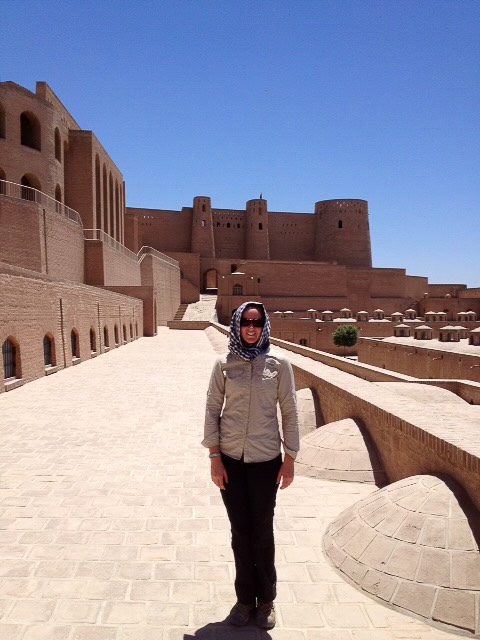
Lt. Cmdr. Laura Hoffner (‘09) deployed eight times in 12 years, serving as one of the first women to support Navy SEAL operations as an intelligence officer.
Hailing from Maine, Hoffner chose Wake Forest with the intention of studying abroad, learning new languages and immersing herself in different cultures. She achieved that goal by studying in Taiwan and Italy, all while on the crew team, serving as a resident adviser and volunteering with Aprender y Enseñar, a nonprofit matching Spanish-speaking students with local agencies that serve Hispanic people.
“There were so many opportunities Wake Forest introduced me to,” said Hoffner. “It was no longer a wish there for me to give back with my time. … Wake made it a reality.”
Hoffner briefly considered Army ROTC but ultimately set her sights on naval intelligence. Shortly after graduating, she attended Naval Officer Candidate School. She completed intelligence training in 2009 before deploying to Afghanistan with a team of Navy SEALS in fast-paced special operations supporting local Afghans and countering extremist networks.
“That was a fascinating deployment,” said Hoffner. “It was exactly what I wanted to do (in the Navy), and I was shocked that I got to do it within five months of joining.”
“It was no longer a wish there for me to give back with my time. … Wake made it a reality.”
The relationships she developed with Afghan nationals would later become a focal point of Hoffner’s service to others.
Hoffner served for 12 years on active duty in the Navy, spending 10 of those years with special operations forces across eight deployments. In the longtime, male-dominated field in military circles, Hoffner says she’s seen the world of special operations open up as a more approachable opportunity for women throughout her career.
“I was one of the first females to hold the role of intel officer for a SEAL squadron position. It can be done, it is being done, and it’s only going to be done better by future generations.”
In 2021, Hoffner transitioned into the civilian workforce alongside other veterans specializing in risk management. Only months later, as the United States prepared to leave Afghanistan, Afghans with Special Immigrant Visa status became imperiled by Taliban forces sweeping across the country.
It became clear there would not be time to evacuate more than 100,000 Afghans before the August deadline for the American withdrawal.
“When Afghanistan fell in August of 2021, myself and a lot of co-workers who had deployed were getting calls from people who were interpreters who were desperate for help,” Hoffner recalled. “We also wanted to support reporters, in particular female reporters, who were at risk in the country.”
Hoffner felt called to help those who had risked their safety to aid her. She and her peers contacted the International Rescue Committee, using their ground connections to arrange evacuation for 362 Afghans to Mexico with help from international relief workers.
Since the success of that rescue, Hoffner and her peers established the 188 Foundation, which coordinates rescue efforts for civilians in conflict areas with the International Rescue Committee. They now facilitate safe passage for Ukrainian refugees.
For Col. Alan Bourque (’81), Pro Humanitate took the form of mentorship: a commitment to learn from others, build meaningful relationships and pay it forward for the next generation of leaders.
Growing up as the son of a 34-year Marine Corps veteran who had served in Korea and Vietnam, Bourque was raised with the expectation of servant leadership.
“My father made it very clear to me that I’d serve somehow, some way, at least for four years. It was a big part of his life, and certainly it was a huge part of our family.”
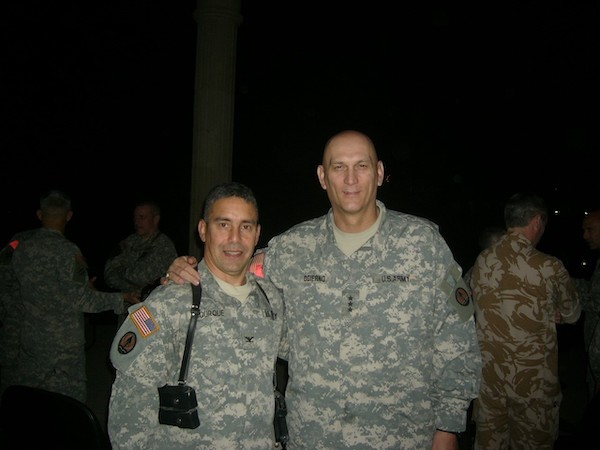
Col. Alan Bourque (’81), left, and Gen. Raymond Odierno on deployment in Iraq. Odierno was a key mentor for Bourque throughout his Army career.
As the first in his family to graduate from college, Bourque discovered that an ROTC scholarship gave him the means to attend Wake Forest and a way to carry on a family tradition of service.
“Being a bilingual kid, I was concerned about my ability to compete (at Wake Forest),” said Bourque. “But when I walked on campus, it was all over.”
Bourque planned to serve four years as an artillery officer after graduation, then leave the military. His first deployment to Germany with a nuclear-capable missile unit during the Cold War revealed his potential for leadership.
“That was really formative for me,” said Bourque. “I ran into a captain who said, “Hey, you’re really good at this. You ought to consider commanding.”
After returning to Fort Sill, Oklahoma, Bourque was pulled out of military schooling early when a unit in Germany that had failed its nuclear inspection asked for him by name to help pass reinspection.
“At this point I realized this was for me,” said Bourque. “I just loved being around and commanding soldiers.”
Bourque had a distinguished career. In Korea, he earned a nomination for the General Douglas McArthur Leadership Award, an honor reserved for the Army’s top five company commanders.
Pro Humanitate is “choosing selflessness in your ability to offer help, coaching and advice to advance and make your people better.”
While in Korea, his wife, Kimberly, established a support group for service members’ families, long before the Army formally recognized Soldier and Family Readiness Groups.
“She was just a force,” said Bourque. “And it was not anything more than just Pro Humanitate — caring about people. She just wanted to make sure people were cared for.”
Gen. Raymond Odierno became a key mentor during Bourque’s deployment in Iraq. Bourque took command of a field artillery battalion then reoriented his career toward educating Army officers and mentoring while spending more time with his family.
Bourque served at the National Training Center at Fort Irwin, California, a prestigious post for officers aspiring to teach others. From there, he became the chief of staff of the Corps of Cadets in the U.S. Military Academy at West Point.
Bourque finished his career developing the curriculum for training general officers at the U.S. Army War College with guidance from his mentor, Odierno, who had become the Army’s chief of staff. Four decades of dedication came full circle in times of adversity. He lost his wife after her battle with a rare form of bile duct cancer. Friends and mentors traveled great distances to support Bourne and his family.
“At my wife’s funeral last year,” said Bourque, “there must have been over 20 former officers that showed up from all over the country. … That’s a testament to her more than anything else, but it was a show of loyalty repaid in a lot of ways.”
Bourque said that to him, Pro Humanitate is “choosing selflessness in your ability to offer help, coaching and advice to advance and make your people better.”
As an Army officer and Wake Forest graduate, I also see the parallels of Pro Humanitate and military service. It’s a blending of deep connections to others, a drive to protect the vulnerable, and strong guidance and leadership that’s passed down to future generations. These are the bedrock principles our Decorated Deacs have learned and lived.
Captain Connor Murphy (’18) is a logistician in the U.S. Army Reserve as an assistant operations officer in the 3rd Transportation Brigade, Expeditionary at Fort Belvoir, Virginia. He was commissioned from Wake Forest’s ROTC “No Fear!” Battalion to the 822nd Movement Control Team in Brockton, Massachusetts, where he was unit commander from 2019-2021. On the civilian side, Murphy writes as digital communications director for the advocacy organization Humanity Forward. He lives in the Washington, D.C., area with his wife, Emma, and their many houseplants.

